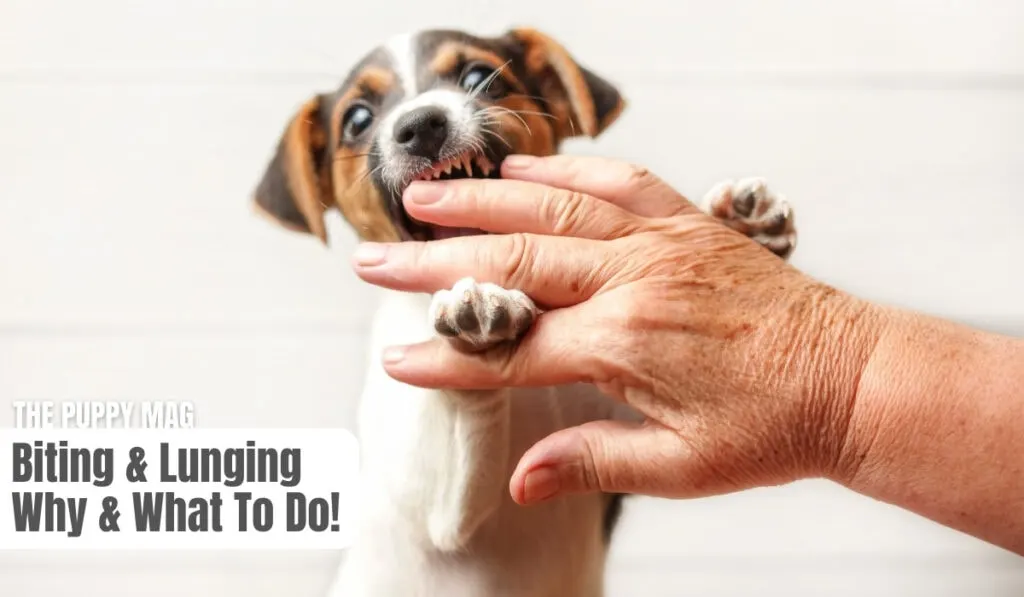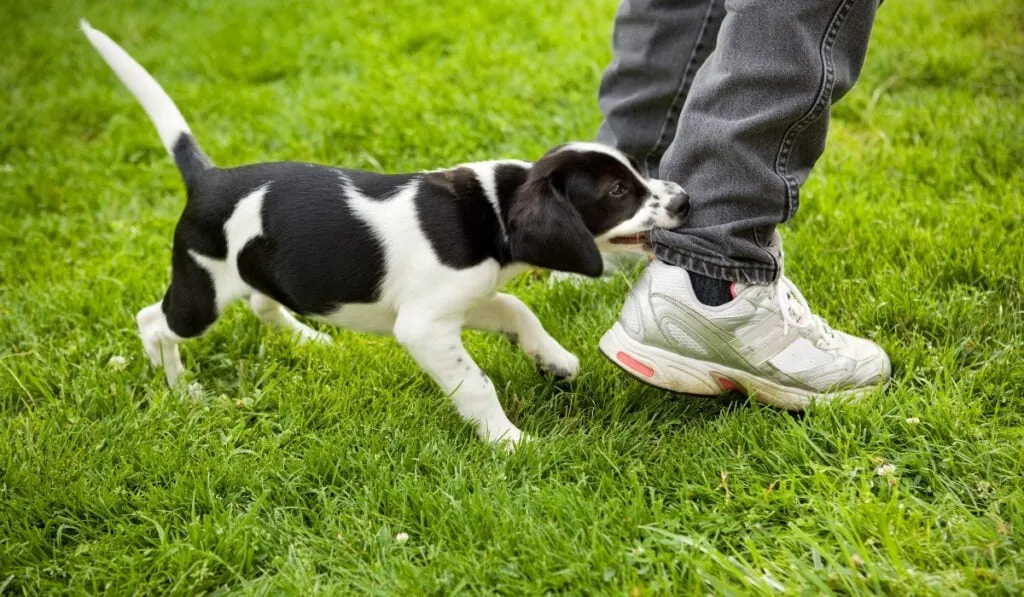No matter how much we love the adorable pups in our life, nobody enjoys the biting and nipping that comes along with puppyhood.
Lunging and biting might just be a little annoyance when it comes from a tiny puppy, but it can quickly turn into a huge issue if it is not corrected before adulthood.
A puppy that struggles with biting and lunging can turn into an unruly adult, so it’s important to tackle this behavioral issue from the moment it develops.
What you’ll discover in this article:
- The 6 reasons why puppies lunge and bite
- The 5 best solutions to stop a puppy lunging and biting
- Whether this behavior is normal for all puppies
- Why it’s crucial to correct this behavior asap
- Whether or not your puppy is showing early signs of aggression
Table of Contents
Is This A Normal Behavior For Puppies?
It may be a frustrating behavior, but puppy biting is completely normal for the growing canine friends in our home.
Puppies use their mouths to explore the world around them, which often causes them to be a bit mouthy in many situations.
Similar to toddlers putting everything in their mouths, our puppies are no different.
In addition to using their mouths to understand their environment, our pups will also go through an uncomfortable teething process.
This causes many puppies to chew on everything around them in search of relief, and this may include chewing on us as well.
There is a rare chance that your puppy could display signs of aggression, but we will discuss that possibility more in-depth throughout this article!

Always Correct Bad Puppy Behaviors From The Moment They Begin
Before we dive into the reasons why your puppy is lunging and biting, it’s important to mention just how essential it is to correct these behaviors immediately.
- While nipping and biting is normal for puppies, it can quickly turn into a major issue as the puppy grows up.
Their tiny puppy teeth may be easy to manage, but a biting adult dog is dangerous for everyone.
If you have ever been around an adult dog that still bites when they are excited, you likely know just how frustrating it can be.
Though these pups do not mean to hurt us, these playful bites can still be extremely uncomfortable!
Even if this is a playful behavior that a dog brings into their adulthood, it can still be a risky habit for everyone involved.
- We don’t want our dogs biting us or anyone else around them, which is why we must put an end to the biting behavior when they are puppies.
6 Reasons Why Your Puppy Is Lunging & Biting
In order to stop this behavior the moment it begins, we must understand the many reasons why our puppies could be lunging and biting.
Let’s break down the most common causes of the behavior below.
1. They Want To Get Your Attention
Whenever our puppies lunge and nip at us as we walk by, many of us will turn around and offer some form of attention to the puppy.
Whether it is a stern correction or you give in to their demand for attention, this shows the puppy that biting actually works.
This will then cause your puppy to rely on lunging and biting to get your attention moving forward, allowing it to become a common behavior that our pups participate in each day.
2. They Want To Play
If your puppy wants to play with you, they will often try to get your attention in some form.
A pup that has not yet learned that biting and lunging is unacceptable may nip at you, and what you do next can determine how this goes moving forward.
If you give into their demands and pick up their favorite toy to play, you are showing them that biting gets your attention.
3. They Are Tapping Into Their Prey Drive
Does it seem like your puppy only lunges and bites you when you walk by? If this is the case, they are likely tapping into their prey chasing instincts.
Most dogs love to chase things that are moving, especially if they are a breed with a high prey drive.
This will cause them to chase everything from a passing animal or interactive toy, as well as our moving hands and feet.
4. They Are Bored
If you have a bored puppy on your hands, they may resort to biting and nipping for entertainment.
Chewing helps their brain feel busy, so biting you or anyone else in your home can seem like a cure to their boredom.
This is especially true if you give in to their biting and engage in playtime, as they will soon think that biting you turns into a fun game.
5. They Are Overstimulated
If your puppy is currently overwhelmed with excitement, this could cause them to become overstimulated.
This is also the case if too many entertaining things are happening at once, as some pups will not know how to release their overwhelming emotions.
If your puppy has not yet learned how to redirect their hyperactivity to appropriate behavior, they may turn to biting and nipping.
6. They Are Teething
Just like in growing humans, our pups can experience mouth pain when they are teething.
This intense pressure under their gums can cause them to seek out any chewing options in their reach, and this may even be our hands or feet.
Not only are appropriate chewing toys essential for the discomfort these puppies experience, but it can help to prevent any bad chewing behaviors that develop during the teething phase.
How Can I Stop My Puppy From Biting And Lunging?

Now that you are aware of the many reasons why your puppy is lunging and biting, it’s time to discuss the most effective ways to put an end to the behavior!
We’ll break down some of the best ways to stop the behavior based on the underlying cause, as well as a few tactics you can try even if you are unsure of the underlying reason.
1. Redirect The Biting Behavior
Oftentimes, our puppies are overwhelmed with pent-up energy and excitement when they are biting or nipping at us.
- We can’t eliminate this playful energy, so it’s up to us to redirect them to a more appropriate behavior.
This means that you will simply offer them a different object or toy to engage with once they begin to bite you.
For example, it’s a good idea to have plenty of appropriate chew toys on hand in each room of your home.
This way, any time your puppy begins to bite, you can simply grab a nearby toy and begin to engage in play with the item instead.
If you do this enough, your puppy will soon learn that you are not the chew toy, but their nearby toys are acceptable!
2. Stop Engaging When Your Puppy Bites
Many of us encourage our puppy’s biting without even knowing it!
For example, if you always turn around and shout at your puppy when they bite you, this could be offering them the attention they are seeking.
- While we may see this as undesirable attention, this engagement is what some bored puppies are looking for.
There is nothing a puppy wants more than your attention, so taking the attention away is the most effective way to end the behavior.
If you are consistent with this each time they bite moving forward, your puppy will soon learn that this behavior gets them nowhere.
You can stop the engagement by simply walking by your biting puppy and trying not to offer them any type of response.
3. Make Sure Your Puppy Is Getting Plenty Of Exercise
If your puppy is struggling with pent-up energy, it will be challenging to tackle any kind of undesirable behavior.
Let’s not sugarcoat it… An understimulated puppy is a recipe for disaster! Typically resulting in everything from biting to destructive behavior.
This is why it is so important to make sure your puppy is getting plenty of exercise each day.
Most puppies do not need anything extreme but rather 20-40 minutes of exercise, depending on the breed.
Just be sure to stick to things like daily walks or games of fetch in the backyard, as anything too strenuous can strain their growing bones and joints.
4. Interrupt Their Biting With A Cue
If your puppy is struggling with biting and lunging, it’s a good idea to establish a verbal cue to pull them out of the behavior.
- However, this cue mustn’t be too harsh or aggressive, as this will not have the desired effect.
This sound should be distracting enough to pull them out of the biting behavior, but not startling enough to scare them.
Some of the most common cues that puppy parents use include a sharp ouch or eek, as this seems to grab their attention without causing any fear.
Once these cues work to interrupt the bad behavior, be sure to redirect with an appropriate chew toy.
5. Avoid Any Harsh Punishment Like Yelling Or Hitting
When it comes to training your growing puppy, negative reinforcement is not effective.
This is especially true when it comes to biting or nipping, as yelling at your puppy or hitting them only seems to exacerbate the behavior.
This only makes your puppy think you are engaging with them, and it doesn’t show them how to redirect their energy.
We know how frustrating a biting and lunging puppy can be, but it’s important to stick to the positive tools that we have discussed above.
Shouting at your puppy or hitting them on the nose won’t make a difference in the long run, and it will only result in fear from your pup.
Is My Puppy Showing Aggression?
If your puppy is biting and lunging at you, you may wonder if a biting puppy is being aggressive.
While this is typically pretty rare for a young puppy, there are a few signs of puppy aggression that you can be on the lookout for.
The most common signs of puppy aggression include:
- Growing or biting while guarding resources like food, toys, bones, etc.
- Bearing their teeth, lip curling, and growling at people or other animals in the home
- Lunging at people or other animals while growling or attempting to bite
- Biting so hard that they actually form a wound or draw blood
- Their growling is accompanied by a challenging stance or harsh stare
If you notice any of the above signs of aggression in your puppy, we suggest reaching out to a professional dog trainer.
This is something that you will want to get under control before they reach adulthood, so it’s important that your puppy receives skilled behavioral training.
Aggression in dogs is not something to take lightly, so a professional trainer is the best option in these situations.
Additional Info: K9ofmine puppy aggression
Final Thoughts
Puppy biting and nipping is extremely common in our growing canine friends. As long as you address the behavior from the moment it begins, you will have a well-behaved pup in no time!
